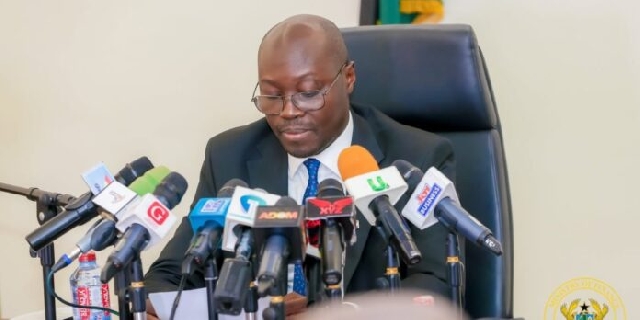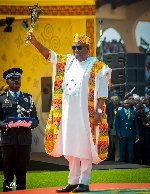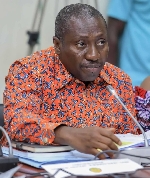IMF engages Ghana on 2025 budget amid plans to scrap some key taxes
 Dr Ato Forson addressing the press
Dr Ato Forson addressing the press
The International Monetary Fund (IMF) has begun critical discussions with the Ghanaian government this week as the country finalizes its 2025 budget, which is scheduled for presentation in March.
The talks come at a pivotal time, with the government planning to abolish several key tax policies, including the E-Levy, betting tax, and COVID-19 levy.
These taxes, introduced by the previous administration to boost domestic revenue, have faced widespread opposition from businesses and the public.
As Ghana remains under a $3 billion Extended Credit Facility (ECF) programme backed by the IMF, the fund will assess how the proposed tax cuts align with the country’s fiscal consolidation goals.
The IMF will seek assurances that removing these levies will not undermine revenue targets or disrupt Ghana’s economic recovery efforts.
Beyond tax reforms, discussions will also address Ghana’s growing energy sector debt, which has placed immense pressure on public finances. Liabilities in the sector are estimated to exceed $2 billion, threatening the financial stability of power producers and the broader economy.
Independent Power Producers (IPPs) have repeatedly raised concerns over delayed payments, warning that prolonged arrears could lead to potential disruptions in electricity supply.
Additionally, the energy sector’s financial distress has contributed to the cedi’s depreciation, as the government requires significant foreign exchange to meet payment obligations.
The IMF is expected to push for structural reforms in the energy sector, including measures to improve cost recovery, enhance efficiency, and establish a sustainable financial model for power production.
During the negotiations, the government is expected to outline a comprehensive plan detailing how it intends to:
Offset revenue losses from the tax cuts Settle outstanding energy sector debts Maintain macroeconomic stability while implementing these reformsThe outcome of these discussions will be closely monitored by investors, businesses, and international partners, as Ghana seeks to strike a balance between fiscal discipline, economic growth, and energy sector stability.
Source: Classfmonline.com/Cecil Mensah
Trending News

Be a President for all and reverse the unfair dismissals - Bawumia to Mahama
08:35
NSA ghost names: Fourth Estate doing ‘fear and panic’ journalism-Nana B
02:06
Euroget to submit issues on completion of Kumasi Military Hospital to Defence Ministry
08:27
Afenyo-Markin: Minority Leader outlines strong constitutional, political reasons President Mahama must reverse ‘recent revocation of appointments of public servants across key institutions’
02:25
GH₵1.3 billion embezzlement claim at NPA unreliable
03:52
NIA receives 700k blank cards to print Ghana Card backlogs
01:36
Mahama warns anti -galamsey taskforce to confiscate not to burn excavators
08:18
Lands Minister exposes NPP's 'double standards' in galamsey fight
03:30
Nana B: NPP National Organiser sues Gov't of Ghana over 'widespread', 'unlawful termination of appointments'
19:14
Majority stops 'injuncted' Akwatia MP from making a statement on the floor
07:19




